Published on May 7, 2020

The electric scooter is, depending on your point of view, a dangerous blight of the sidewalk or a marvelous new species of transit that is perfect for the zero-emissions future city.
So it’s a cause for celebration — or mourning — that the novel coronavirus is dealing the world’s networks of shared scooters a heavy blow. They have vanished from the streets, and in some cities they might not return.
The impact of COVID-19 on shared scooters has been almost as devastating as it has been for high-touch environments like bars and hair salons.
According to data from Earnest Research on credit card and debit card spending by Americans, and visualized by The New York Times, spending on scooter services recently dropped to almost zero, a bigger hit than even mass transit, which has seen its ridership evaporate.
The reason is simple: No one is traveling, and those who are don’t want to touch handlebars and brakes of a shared vehicle that might harbor viruses.
“Wow, seems kind of icky,” is how Don MacKenzie, head of the Sustainable Transportation Lab and professor of Civil and Environmental Engineering at the University of Washington, put the new perception among many users.
Continue reading at E&E News.
Originally written by David Ferris for E&E News.